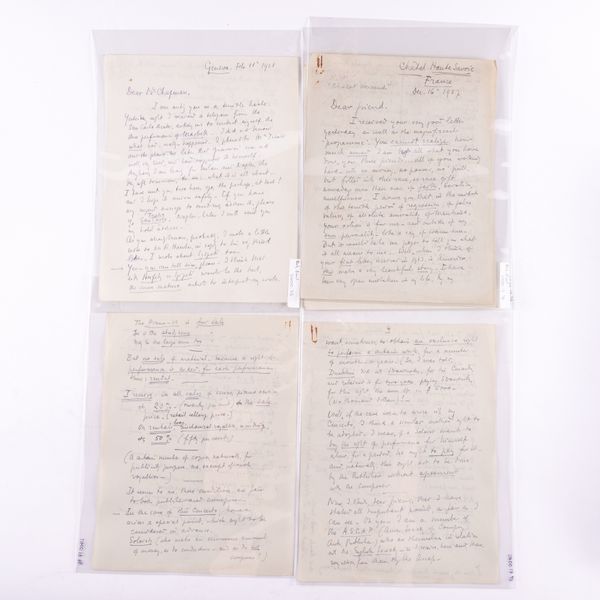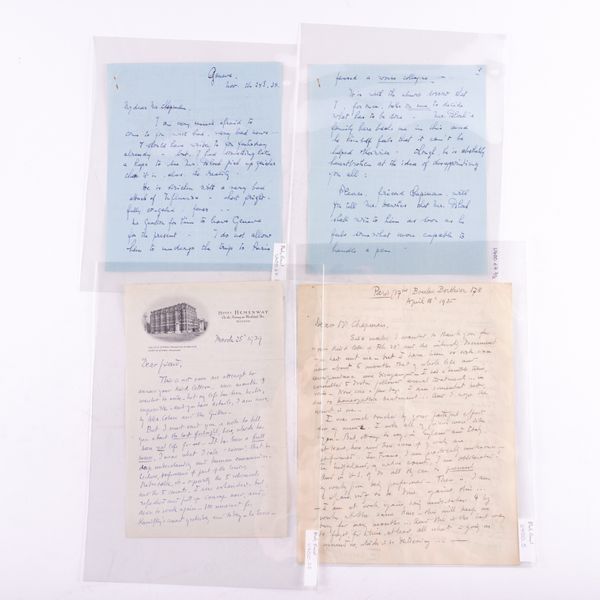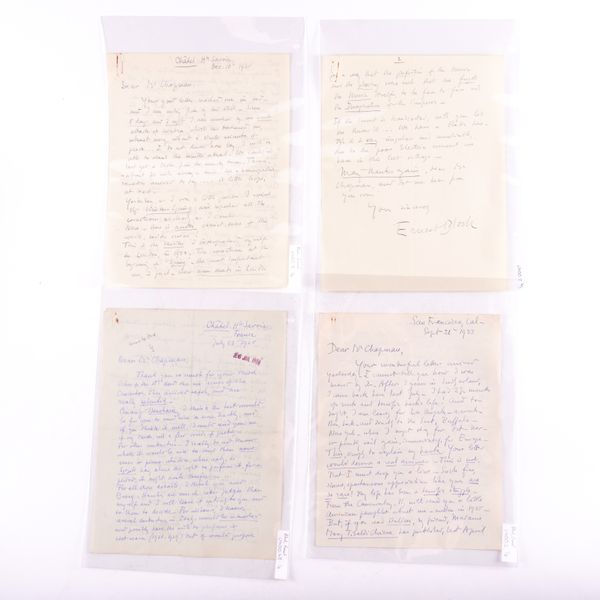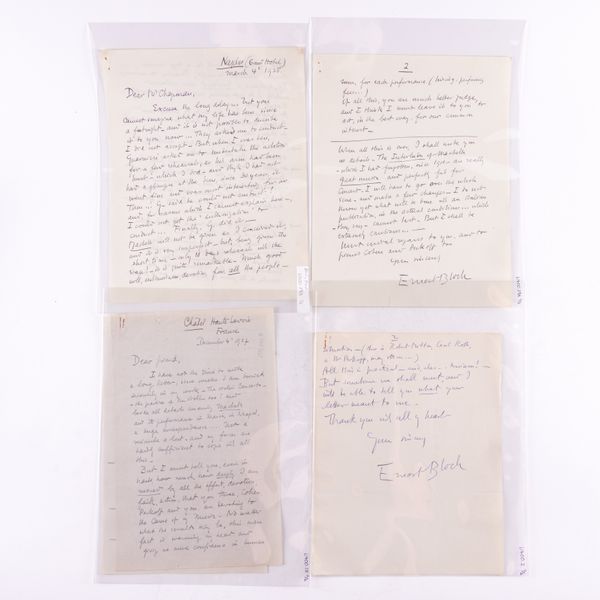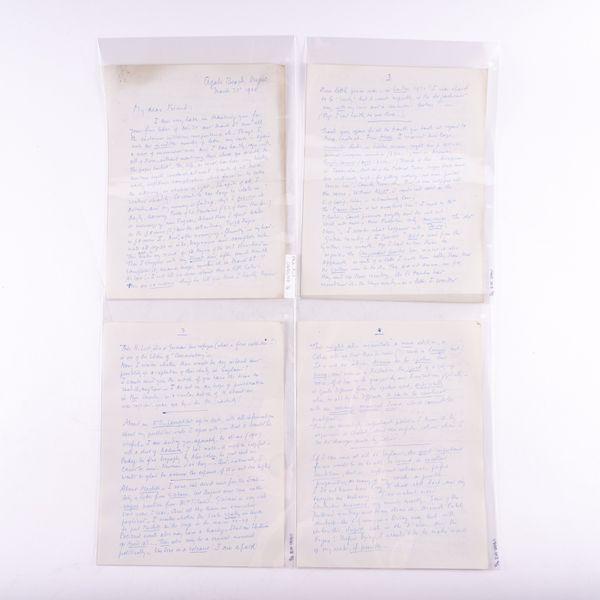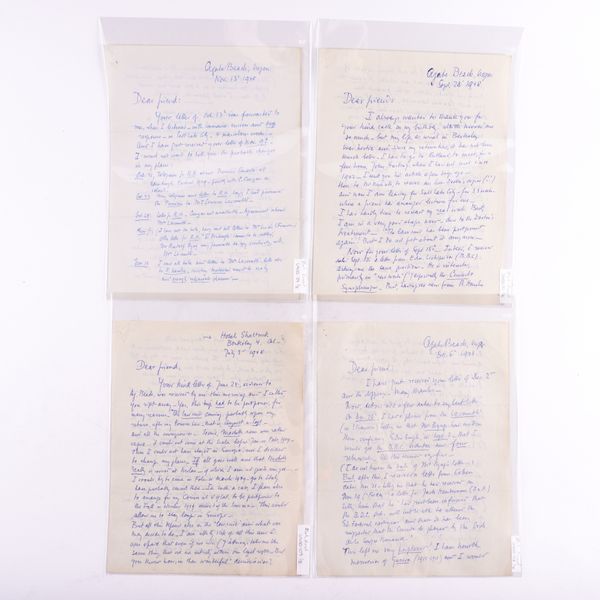BLOCH, Ernest (1880-1959). An important correspondence comprising c.120 autograph and typed letters, signed ("Ernest Bloch"), to Ernest Chapman, many with his replies, 1933-58.
| Estimate: | £2,000 - £3,000 |
| Hammer price: | £850 |
BLOCH, Ernest (1880-1959). An important correspondence comprising c.120 autograph and typed letters, signed ("Ernest Bloch"), to Ernest Chapman, many with his replies, San Francisco, Paris, Châtel, Geneva, Naples, New York, Rangeley (Maine), North Platte (Nebraska), Agate Beach (Oregon) and elsewhere in America, 21 September 1933 to 17 August 1958. In English. c.345 pages, various sizes, some on postcards, telegrams or greetings cards. [With:] 12 letters to Chapman from Bloch's wife, Marguerite [And:] typescript by Ernest Chapman of "Ernest Bloch at 75" published in the 20th-century music journal "Tempo" (of which Chapman was the first editor), with autograph comments and corrections in Bloch's hand. An important correspondence between Ernest Bloch and Ernest Chapman, an indispensable source for the musical career, opinions, methods and personal life of the great Swiss composer, a singular figure in the music of the 20th century. The correspondence presents – except for a period of three years during WWII – a continuous picture of the last twenty-five years of Ernest Bloch's life, from 1933 and continuing until a few months before his death. Throughout this period Bloch was actively composing, continuing even during his long final illness. Among the subjects covered in the correspondence are the gestation and creation of new works, including such important compositions as the "Violin Concerto" (recorded by Szigeti, Menuhin, Totenberg, Bress, etc), the "Avodath Hakodesh" (or "Sacred Service", recorded by Bloch and Bernstein), the "Voice in the Wildernes for Cello and Orchestra", the "Concerto Symphonique for Piano and Orchestra", the "Piano Sonata", the final "Suites for Unaccompanied Stringed Instruments" (shortly to be recorded by Menuhin) and other works, including the difficulties with the revival of his opera, "Macbeth", 30-years after it was written, with the last-minute resignation of the conductor and Bloch’s illness; his conducting activities with leading orchestras in Europe and the United States; and his composition teaching courses at the University of California. In some letters he discusses the origin of his Jewish national style, and how he came to regard this in later years, and his artistic and philosophical outlook as a whole; some contain references to his personal life, and his view of his life as "a tragedy" and his opinions on contemporaries such as Schoenberg and Stravinsky. He expounds upon his method of teaching composition, with many references to his extremely detailed analyses of Beethoven's "Eroica", fugues by Bach, works by Lassus ("incomparable"), Josquin de Pres ("no less extraordinary – more daring"), Palestrina and others; expressing his concern that his huge collection of pedagogical material should be properly edited and published. During their twenty-five year relationship Bloch regarded Ernest Chapman first as a young admirer of his music, then as his publisher at Boosey & Hawkes, and eventually as a friend and confidant to whom he wrote, with ever increasing frankness, about himself, his music and the world at large. The correspondence as a whole constitutes a unique and indispensable source of information about Bloch's activities and thinking during the period of his full maturity as both man and artist. Bloch was a highly articulate writer and these letters reveal a man of deep culture, wide-ranging interests and passionate feelings. His prose is concise and clear, always lively and often extremely vivid. Ernest Chapman's replies are in a cooler, more prosaic style, making an appropriate foil. Contained in two boxes. Please note that only a small part of the lot is illustrated. Provenance: Sotheby's, 27 November 1980, lot 216.
